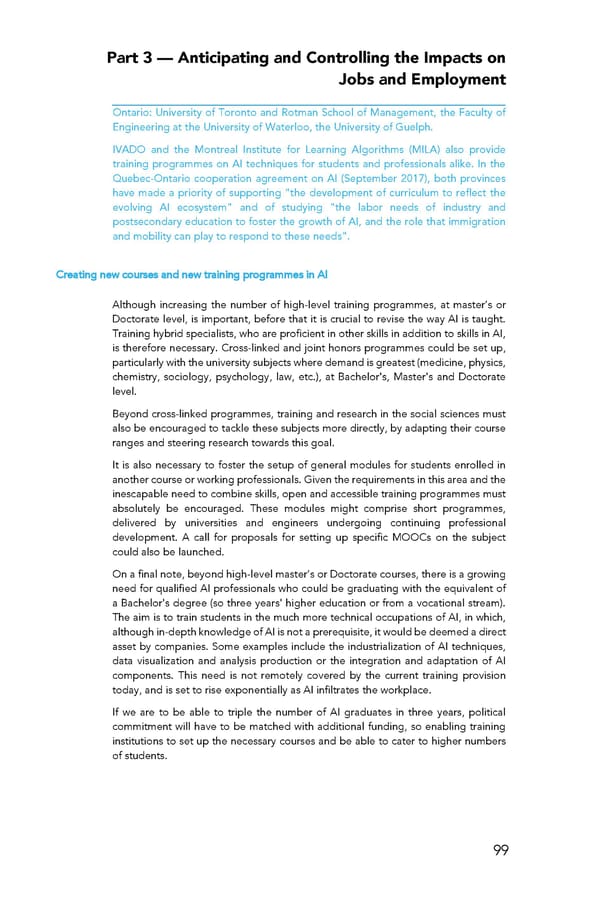Part 3 — Anticipating and Controlling the Impacts on Jobs and Employment Ontario: University of Toronto and Rotman School of Management, the Faculty of Engineering at the University of Waterloo, the University of Guelph. IVADO and the Montreal Institute for Learning Algorithms (MILA) also provide training programmes on AI techniques for students and professionals alike. In the Quebec-Ontario cooperation agreement on AI (September 2017), both provinces have made a priority of supporting "the development of curriculum to reflect the evolving AI ecosystem" and of studying "the labor needs of industry and postsecondary education to foster the growth of AI, and the role that immigration and mobility can play to respond to these needs". Creating new courses and new training programmes in AI Although increasing the number of high-level training programmes, at master’s or Doctorate level, is important, before that it is crucial to revise the way AI is taught. Training hybrid specialists, who are proficient in other skills in addition to skills in AI, is therefore necessary. Cross-linked and joint honors programmes could be set up, particularly with the university subjects where demand is greatest (medicine, physics, chemistry, sociology, psychology, law, etc.), at Bachelor's, Master's and Doctorate level. Beyond cross-linked programmes, training and research in the social sciences must also be encouraged to tackle these subjects more directly, by adapting their course ranges and steering research towards this goal. It is also necessary to foster the setup of general modules for students enrolled in another course or working professionals. Given the requirements in this area and the inescapable need to combine skills, open and accessible training programmes must absolutely be encouraged. These modules might comprise short programmes, delivered by universities and engineers undergoing continuing professional development. A call for proposals for setting up specific MOOCs on the subject could also be launched. On a final note, beyond high-level master’s or Doctorate courses, there is a growing need for qualified AI professionals who could be graduating with the equivalent of a Bachelor's degree (so three years' higher education or from a vocational stream). The aim is to train students in the much more technical occupations of AI, in which, although in-depth knowledge of AI is not a prerequisite, it would be deemed a direct asset by companies. Some examples include the industrialization of AI techniques, data visualization and analysis production or the integration and adaptation of AI components. This need is not remotely covered by the current training provision today, and is set to rise exponentially as AI infiltrates the workplace. If we are to be able to triple the number of AI graduates in three years, political commitment will have to be matched with additional funding, so enabling training institutions to set up the necessary courses and be able to cater to higher numbers of students. 99
 For a Meaningful AI - Report Page 99 Page 101
For a Meaningful AI - Report Page 99 Page 101